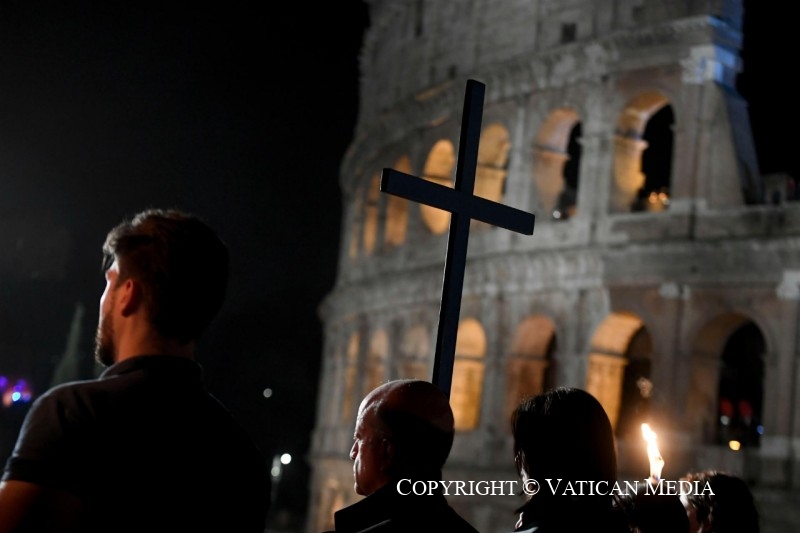Pope Francis: the Way of the Cross of those who change direction
The convalescing pontiff wrote meditations for this evening's rite at the Colosseum, which he will follow from Casa Santa Marta. “The steps you take as you leave the city can foreshadow our own exodus to a new land,” the pope writes. Some of the evils of a world that call for redemption are an economy ruled by the cold logic of algorithms, crocodile tears, and divisions within the Church. Joseph of Arimathea is an icon of the boldness of hope.
Vatican City (AsiaNews) – In the meditations he prepared for this year’s Way of the Cross, Pope Francis says that, “The Stations of the Cross is the prayer of people on the move. It disrupts our usual routine and enables us to pass from weariness and apathy towards true joy.”
Like every year, the path for the Good Friday service this evening in Rome will be the same one handed down by popular devotion with the evocative setting of the Colosseum in the background.
The pontiff will not be present in person at the event since he is not fully recovered from bilateral pneumonia, which saw him hospitalised last month; instead, the Holy Father will follow the annual worldwide broadcast from Casa Santa Marta.
Cardinal Baldo Reina, vicar of Rome, will lead the service, but in this Jubilee year, the prayer will still be marked by the meditations that Francis himself prepared. It will be a Way of the Cross marked by a single idea, namely that Jesus's way to Calvary as a path that calls on everyone to "change direction". Indeed, the steps you take as you leave the city can foreshadow our own exodus to a new land,” reads the introduction to the Meditations.
Yet the latter say that, “following the path of Jesus has a price: in this world that puts a price on everything, gratuitousness proves costly. In that gift, however, everything blossoms anew: a city split into factions and torn by conflict can move towards reconciliation; an arid piety can rediscover the freshness of God’s promises; and a heart of stone can turn into a heart of flesh. We need only hear his invitation: ‘Come! Follow me!’ And trust in that gaze of love.”
Francis’s commentary on the Passion of Jesus echoes today's personal and collective wounds. Jesus’s falls along the path to Calvary remind us that, “Today’s builders of Babel tell us that there is no room for losers, and that those who fall along the way are losers. Theirs is the construction site of Hell.”
While today’s “world of calculation and algorithms, of cold logic and implacable interests” is inhuman, “God’s economy, on the other hand, does not kill, discard or crush,”
Noting the tears of the women of Jerusalem, the pontiff says: “Lord, our broken world, and the hurts and offences that tear our human family apart, call for tears that are heartfelt and not merely perfunctory. Otherwise, the apocalyptic visions will all come true: we will no longer generate life, and everything around us will collapse.”
Jesus, burdened by the cross, lowers himself until his face touches the ground, becoming the manifesto of a salvation founded on mercy.
“Who are you, Jesus, who forgives even sins? Fallen to the ground on the way of the cross, you are the Saviour of this earth that we tread, this earth from which we were made. Here, on this earth, you continue to shape us, like a skillful potter.”
The soldiers who split among themselves Jesus's clothes are a reminder of his Church. “And if the Church may appear today as a torn garment, teach us how to weave anew the fabric of our fraternity, grounded in your gift,” reads the pontiff‘s prayer.
Still, not even on the cross is Jesus stripped of his freedom. “[Y]ou decide why and for whom you are there. You are attentive to both the men crucified with you: you let slip the insults of one and you hear the plea of the other.”
“Nailed to the cross you intercede: you “stand between’” conflicting parties. And you bring them to God, because your cross tears down walls, cancels debts, quashes judgements, establishes reconciliation. You yourself are the true Jubilee. Convert us to you, Jesus; though nailed fast to the cross, you are able to do all things.”
In this Holy Year of hope, the Way of the Cross is also a precious school of this Christian virtue, though, for example, the figure of Joseph of Arimathea, who asked Pilate for the body of Jesus after his death.
“You are now in the hands of someone who continues to hope, one of those who refuse to think that injustice always prevails. You break the bonds of the inevitable, Jesus. You challenge the mindsets that devastate the earth, our common home, and human solidarity.
“You grant to those who ‘wait expectantly’ for your kingdom the courage to speak to power: like Moses before Pharaoh, like Joseph of Arimathea before Pilate. You embolden us to take on great tasks. In this way, even in death, you continue to reign. For us, Jesus, to serve you is itself to reign.”
Such hope must be nurtured with patience even in the silence of the tomb.
“In a world of hectic activity, Jesus, you now experience your Sabbath;” reads14th meditation. “Lord Jesus, who seem to sleep amid the tempests of this world, bring us all into the peace of the Sabbath rest. Then we shall see creation in all its beauty and goodness, destined for resurrection. Then there will be peace for your people and peace among the nations.”







.png)










